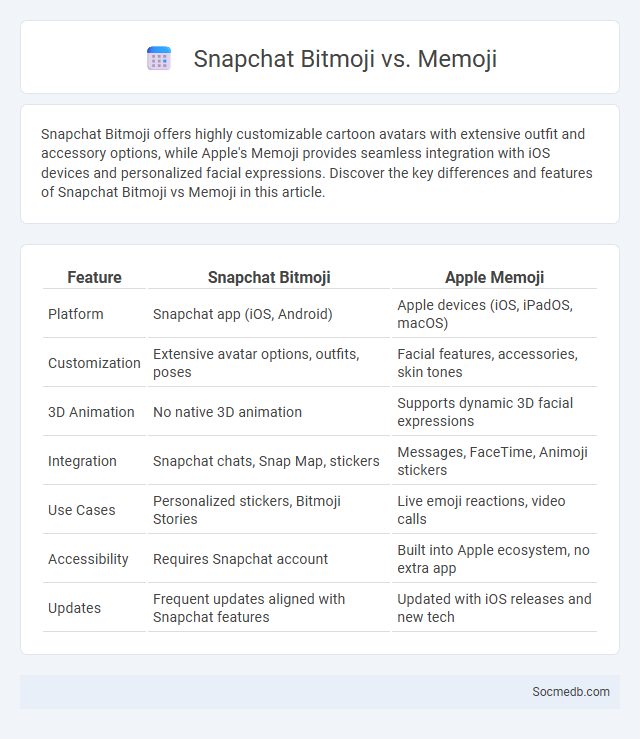
Photo illustration: Snapchat Bitmoji vs Memoji
Snapchat Bitmoji offers highly customizable cartoon avatars with extensive outfit and accessory options, while Apple's Memoji provides seamless integration with iOS devices and personalized facial expressions. Discover the key differences and features of Snapchat Bitmoji vs Memoji in this article.
Table of Comparison
| Feature | Snapchat Bitmoji | Apple Memoji |
|---|---|---|
| Platform | Snapchat app (iOS, Android) | Apple devices (iOS, iPadOS, macOS) |
| Customization | Extensive avatar options, outfits, poses | Facial features, accessories, skin tones |
| 3D Animation | No native 3D animation | Supports dynamic 3D facial expressions |
| Integration | Snapchat chats, Snap Map, stickers | Messages, FaceTime, Animoji stickers |
| Use Cases | Personalized stickers, Bitmoji Stories | Live emoji reactions, video calls |
| Accessibility | Requires Snapchat account | Built into Apple ecosystem, no extra app |
| Updates | Frequent updates aligned with Snapchat features | Updated with iOS releases and new tech |
Introduction: Digital Avatars Revolution
Digital avatars revolutionize social media by transforming how users express identity and interact online. Your personalized avatar enhances engagement by creating a unique, immersive presence across platforms such as Instagram, TikTok, and Snapchat. Leveraging AI and augmented reality, these avatars bridge physical and virtual interactions, driving a new era of authentic digital communication.
What is Snapchat Bitmoji?
Snapchat Bitmoji is a personalized cartoon avatar that represents you in chats, stories, and snaps within the Snapchat app. It allows users to customize facial features, hairstyles, outfits, and accessories to create a unique digital persona. Integrating Bitmojis enhances user engagement by adding a fun, expressive element to social media communication.
What is Apple Memoji?
Apple Memoji is a customizable animated emoji feature available on iOS devices, allowing users to create personalized avatars that mirror their facial expressions in real-time. Your Memoji can be shared across social media platforms, enhancing digital communication with interactive and expressive visual elements. This tool leverages facial recognition technology to ensure that your emotions and movements are accurately reflected in messages, making conversations more engaging.
Bitmoji Overview and Features
Bitmoji offers personalized emoji avatars that enhance social media interactions by allowing users to express emotions and reactions uniquely. Its features include customizable facial expressions, outfits, and animations that integrate seamlessly with platforms like Snapchat, Instagram, and Facebook. This customization boosts user engagement and adds a fun, relatable dimension to digital communication.
Customization Options: Bitmoji vs Memoji
Bitmoji offers extensive customization options with a wide range of clothing, accessories, and facial features, allowing users to create highly personalized avatars for various social media platforms. Memoji, integrated within Apple's ecosystem, provides dynamic facial expression tracking and seamless animation, enhancing user interaction on iOS devices. Both tools leverage unique customization features to boost user engagement and self-expression on social media channels.
Integration with Social Platforms
Integration with social platforms enables seamless sharing and real-time interaction across channels like Facebook, Instagram, and Twitter. APIs facilitate automatic posting, user authentication, and data syncing, enhancing both user engagement and marketing analytics. Leveraging social platform integration boosts brand visibility, drives traffic, and supports targeted advertising through precise audience insights.
User Experience and Accessibility
Social media platforms enhance user experience by implementing intuitive interfaces, personalized content algorithms, and fast-loading features optimized for diverse devices. Accessibility improvements include screen reader compatibility, alternative text for images, and customizable display settings to support users with disabilities. Prioritizing inclusive design fosters greater engagement and ensures equitable access for all social media users.
Privacy and Data Concerns
Social media platforms collect vast amounts of user data, raising significant privacy and security concerns related to unauthorized access and data breaches. Users often unknowingly share personal information that can be exploited for targeted advertising, identity theft, or surveillance. Strengthening data protection regulations and promoting transparent privacy policies are essential to safeguard user rights and build trust in digital interactions.
Popularity and User Demographics
Social media platforms like Facebook, Instagram, and TikTok dominate global usage with billions of active users, especially among younger demographics aged 18 to 34. You will find that platforms such as LinkedIn attract professionals aged 25 to 45, emphasizing career networking and business growth. Understanding these user demographics can help tailor content strategies to maximize engagement and reach.
Verdict: Which Avatar App is Best?
The best avatar app depends on user priorities such as customization options, ease of use, and platform compatibility. Bitmoji excels with extensive personalization and seamless integration with Snapchat, while Zmoji offers diverse facial features and stylish accessories for unique avatars. For advanced AI-driven likeness and realistic animations, apps like Avatarify provide superior performance, making them ideal for users seeking dynamic and lifelike avatars.
 socmedb.com
socmedb.com